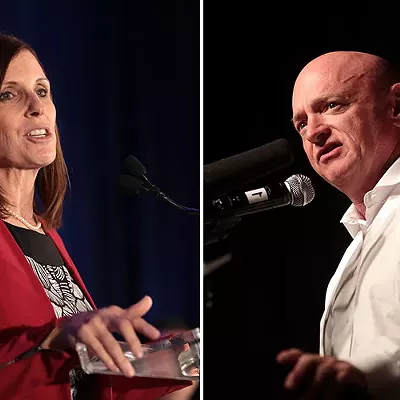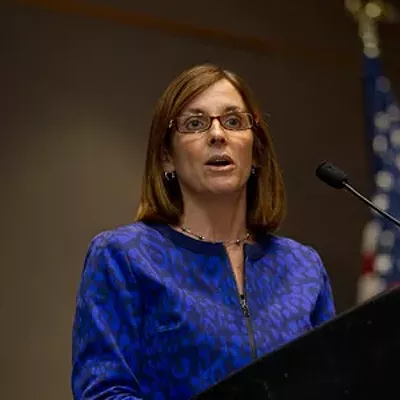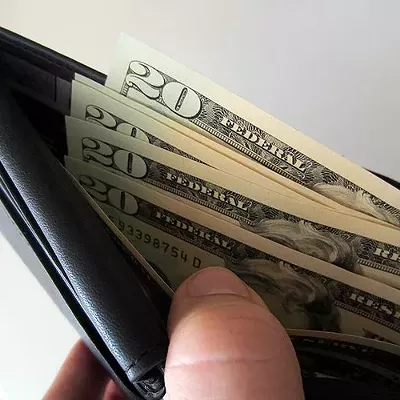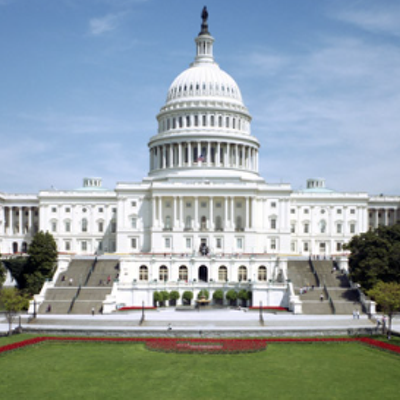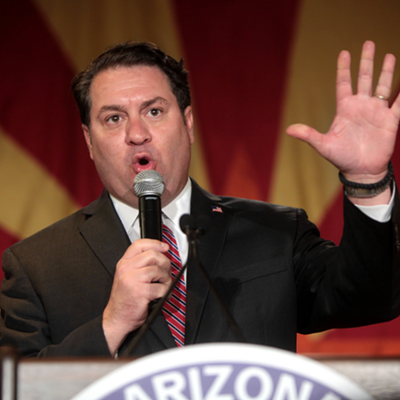BARBER'S SHUTDOWN SHUFFLE
The Skinny mentioned last week that Congressman Ron Barber had lost a few friends on the left when he crossed party lines to vote alongside Republicans on one of the final votes to prevent the federal government shutdown.
Barber went along with a GOP plan that included a continuing resolution—aka a CR—to keep the government open, provided the Democrats agreed to two changes in the Affordable Care Act: Delaying any penalties related to not acquiring insurance for one year and prohibiting the Obama administration from providing any support to members of Congress or their staff as they purchased insurance on the health exchanges.
The vote on the CR was something of an exercise in kabuki theater, in that Republicans knew all along that the Democrat-controlled Senate and the White House were insisting on a "clean" CR that did not come with any conditions attached.
Barber was one of nine Democrats to vote with Republicans on the CR—and he enraged many Democrats back here in Southern Arizona, who felt he had betrayed them by going along with the GOP.
In an interview with The Skinny, Barber reiterated his support for the Affordable Care Act, although he said there were elements that needed to be improved.
He said he'd already voted once for a one-year delay in the individual mandate, so he says he "felt he really needed to be consistent" on the issue.
But there's a political dimension, too. Barber won his 2012 against Republican Martha McSally by about 2,500 votes—and McSally is already gunning for a rematch.
Barber's CD2 is a district that has a slight Republican voter-registration edge, with roughly 134,000 Republicans, 131,000 Democrats and 126,000 voters who aren't affiliated with either major party. The electorate that's going to turn out in 2014 will be much more favorable to McSally than to Barber because there won't be the boost of a presidential race to lure in casual voters.
So Barber needs to find ways to ingratiate himself with independent and conservative-leaning voters. One way to do that: Talk tough on the border, as Barber has done. Another is taking some votes that would change the nature of the Affordable Care Act, as Barber did on the budget vote last week.
But those actions carry an opposite reaction: They alienate the Democratic base that Barber needs to excite to win as well—and the budget vote, especially, has pissed off a vocal bunch of Democrats.
That could be bad for Barber, because he needs a lot of enthusiasm when it comes time to campaign next year. One reason Gabby Giffords was one of the few Democrats to survive the
2010 midterm purge was her turn-out-the-vote operation, which was one of the best in the country.
Barber has inherited key members of that campaign team, but he still needs a way to spark the volunteers into putting in those long hours walking door to door and making phone calls. And votes like last week's don't help with that.
But unhappy Democrats have to ultimately decide if they'd rather have a Republican in the office.
McSally picked Oct. 1—the day of the shutdown—to formally announce her entry into the race. While she faces some primary opposition—Republican Ed Martin announced his plans to seek the office a few days ahead of McSally and a third candidate is exploring the race—she's clearly the favorite, given her strong showing last year and the presence of National Republican Congressional Committee spokesman Daniel Scarpinato at her Tucson announcement last week.
As she barnstormed around Southern Arizona, McSally pushed the general theme that Washington was suffering from "failed leadership" that she could correct if she were elected to Congress.
But in a brief meeting with the press, McSally sidestepped some key questions. She wouldn't say whether she'd vote for a clean CR if one were offered and, when asked about immigration reform, she refused to say whether she'd support a path to citizenship for the undocumented people now in the United States.
McSally's spokeswoman, Kristen Douglas, said the candidate would be available for a longer interview at a later date, so it may well be that McSally will be taking positions on the issues and not just running on her biography.
But Rodd McLeod, a strategist with Team Barber, criticized McSally's failure to answer substantive questions.
"Martha McSally pretends that she wants to do things different, but the people bankrolling her campaign are the people in charge of Congress," McLeod said via email. "Even worse, with the government in crisis as her Tea Party allies forced a shutdown, McSally refuses to say how she would vote in Congress."
ELECTION LAW TUSSLE
The battle is on over whether a referendum to overturn an overhaul of Arizona's election law will make the ballot.
Opponents of HB 2305, who say it is designed to disenfranchise voters and suppress turnout, turned in more than 146,000 signatures last month.
After reviewing the petitions, the Arizona Secretary of State's Office announced last week that, after disqualifying some of the petitions, the Protect Your Right To Vote Committee had 139,161 signatures.
The next step: A random sample of 5 percent of the signatures (which comes out to 6,959 signatures) will be selected for review by the various county recorders, who will determine what percentage are valid signatures. That accuracy rating will be compared to the number of signatures collected to determine whether the referendum has the necessary 86,405 valid signatures to force an election.
Last week, supporters of HB 2305—who maintain that the overhaul was designed to protect against fraud, streamline vote counting on Election Day and prevent sham candidates from third parties from appearing on the ballot—wrote a letter to the Secretary of State in an attempt to strike a number of signatures gathered by four petition passers.
Barrett Marson, a spokesman for the Stop Voter Fraud Committee, said that those petition passers had been found to be ineligible in a Tucson court case earlier this year.
But Robbie Sherwood, a political consultant who is working for the Protect Your Right To Vote Committee, said that two of the four people named in the letter did not work for the committee. He said the committee was prepared to defend the eligibility of the other two petition passers in court.
Both Sherwood and Marson said that election officials had informed them that the Secretary of State's Office would not be taking action on the Stop Voter Fraud Committee's call to disqualify the challenged petition passers. Amy Chan, the Secretary of State's election director, did not return a phone call and email from the Tucson Weekly.
Sherwood said that based on the number of signatures in the random sample that was going out to county election officials, the group would need a 62 percent validity rate to make the November 2014 ballot, according to Sherwood.
"We believe we will be much higher than that," Sherwood said.
If the referendum passes that threshold, the new election law will be on hold until voters determine whether it should be approved.
Marson said he anticipated a court fight over the validity of the petition signatures once they are released to the public and available for review.
"This the bottom of the second inning and maybe they're up 2-1," Marson said. "There's a long way to go."
Sherwood said he was confident that the signatures would hold up under review.
"This is not going to work out the way that they want," Sherwood said. "We did not run this campaign as sloppily as others have before. It is not surprising that they are pulling out all the stops to prevent a vote on this, because we know the public values their right to vote and they're going to hold the line on this and reject 2305 when it is on the ballot."


